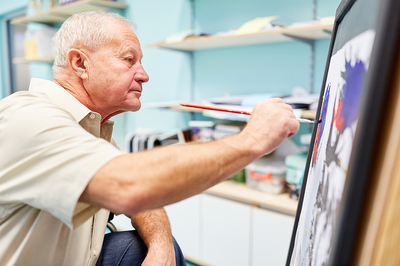
Painting is just one form of experiential therapy that can be used to help people struggling with addiction.
Addiction is complex and multi-factored. So is its treatment. One method often incorporated into the treatment plan for substance use disorder is experiential therapy. Here’s a closer look at this therapeutic technique and how it can fit into treatment and recovery.
About Experiential Therapy
Experiential therapy uses a variety of expressive tools that allow patients to recreate past experiences in order to become more aware of their subconscious emotions, attitudes, and beliefs, according to Psychology Today.
While cognitive behavioral therapy, another form of therapy used in addiction treatment, works to uncover the thoughts behind a person’s decisions, experiential therapy dives deeper into past experiences.
Experiential therapy may include a number of different techniques, such as music, role-playing, acting, animal care, guided imagery, and other activities all aimed at helping patients get in touch with their feelings. Performed under the direction of a trained experiential therapist, experiential therapy can help patients process their emotions toward releasing negative feelings, which may be interfering with their recovery. It is especially suitable for people who may have a hard time talking about their issues openly with a therapist.
Experiential therapy is used for treating a number of different conditions, including trauma, behavior disorders, anger management, eating disorders, grief and loss, physical and behavioral addictions, and substance abuse. It’s often performed in clinical and medical settings, including in rehabilitation programs in conjunction with other techniques, such as cognitive behavioral therapy and group therapy.

A qualified experiential therapist can help guide addicts to better understand their feelings and emotions.
The Power of Perception
According to Psychology Today, “A fundamental premise of experiential therapy is that one’s perception determines one’s behavior. By re-experiencing and releasing repressed negative emotions from the past, the client is better able to experience positive feelings such as love, forgiveness, and calm in the present, changing their perception of reality.”
Because experiential therapy encompasses a broad range of tools, it may differ from person to person and from program to program. It is inherently client-centered, meaning that while one person may benefit from animal-assisted therapy, art may be more suitable for someone else. However, all have the same goal: to help people better access their own inner thoughts and emotions in order to be able to reflect on them and to learn from them.
Experiential therapy is an effective treatment for many people struggling with addiction. It has been proven to have significant benefits for helping to facilitate psychological health and wellness. However, as with all treatments, it should be performed by a licensed and trained clinician with experience in the approach. Seeking out a reputable and certified treatment center is the best way to ensure that you’re working with a trained and credentialed experiential therapist.
Experiential therapy is not a substitute for other forms of treatment for substance use disorder. Rather, it is a complementary tool that can be used alongside other methods, such as medication and cognitive behavioral therapy. If you or someone you love is suffering from addiction to drugs or alcohol, experiential therapy can be an effective way to identify and move past underlying emotions which can impede recovery. Leading St. Louis area rehabilitation center, Harris House, has been providing targeted addiction treatment programs for more than 50 years. Call us today to learn about admissions.







